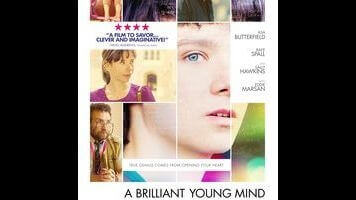The improved awareness and understanding of autistic spectrum disorders has led to a boom in people with autism and Asperger’s in movies and on TV over the past decade. That higher level of neurodiversity in popular culture works against something as remedial as A Brilliant Young Mind, which at times plays like a case study more than a drama. The opening scene introduces introverted Yorkshire lad Nathan Ellis, who’s excessively fussy about food, is obsessed with numbers and patterns, and barely communicates with anyone but his father. When Nathan’s dad dies, he muddles along with his mother Julie (played by Sally Hawkins), who hires Martin (Rafe Spall), a self-pitying math genius with multiple sclerosis, to be his tutor. For roughly the first half hour, a succession of scenes with Julie and Martin serve mainly to establish just how difficult Nathan can be. By the time the story jumps ahead to Nathan as a teen—where he’s played by Hugo’s Asa Butterfield—A Brilliant Young Mind has spent more time defining his tics and obstacles than showing who he actually is.
Once the plot thickens, the movie becomes a little more nuanced—at least for a bit. Martin spends years getting Nathan ready for the International Mathematics Olympiad, the first stage of which requires him to attend a camp in Taipei, led by the British team coach (Eddie Marsan). A Brilliant Young Mind’s director, Morgan Matthews, previously made the 2007 documentary Beautiful Young Minds, which was about the process of selecting and training the U.K. students who compete in the IMO. So it makes sense that he’d have the best feel for the scenes where all these gifted students are gathered in one place. In the Taipei sequences, Matthews and screenwriter James Graham are most successful at showing the world through Nathan’s eyes, as he adjusts to a foreign country, and to his first-ever circle of friends.
If nothing else, putting kids with multiple disorders and savants in the same room helps give them each distinct personalities, which is something A Brilliant Young Mind fails to do much of the time. The best scenes in the entire film contrast Nathan’s nervous reticence with another teammate on the spectrum, Luke (Jake Davies), who talks constantly, has a sour opinion about everything, and quotes Monty Python routines in a humorless tone of voice. When a depressed Luke asks Nathan, “How did your mom and dad explain it to you?”—referring to their respective diagnoses—that one line suggests more about the autistic capacity for sophisticated self-reflection than anything else in the movie.
Otherwise, A Brilliant Young Mind keeps Nathan too much at arm’s length, depicting him as either completely unknowable or shallow in his needs and desires. This problem isn’t exclusive to Nathan either. All the movie’s characters are one-dimensional: the doting mother who gets no thanks from her emotionless son, the coach who values winning over nurturing, the tutor who uses his handicap as an excuse for why his life is a shambles, and so on. It’s just that the weak character-building is more glaring when it comes to Nathan, who’s presented throughout as a problem that needs solving. (Hence the film’s original title: X+Y.) A Brilliant Young Mind is a throwback to the days when nearly every movie about people with autism had to do with whether they could learn to show love; and in making that the main focus, the story eventually strays from its most effective material, which is the math competition.
It didn’t need to be like this—not in an era when the best-selling novel and Tony-winning play The Curious Incident Of The Dog In The Night-Time both exist, and where there’s scarcely a sitcom, procedural, or prestige drama on American TV that doesn’t feature a high-functioning character with autism. There’s no excuse for A Brilliant Young Mind to be so limited in the way it imagines its hero. Why is there so little connection between the younger Nathan in the opening scenes and the one at the end of the film—and so little sense that he might have evolved since the day he saw his father die, and he might have developed new tastes and habits over the course of a decade? Why is there so little feel for him as a person, beyond suggesting what he’s lacking? When a movie about an amazing math competition stops being about the skill and wit of one its brightest competitors and starts being about whether he’ll ever be able to hold his mommy’s hand, something’s gone awry.

 Keep scrolling for more great stories.
Keep scrolling for more great stories.
